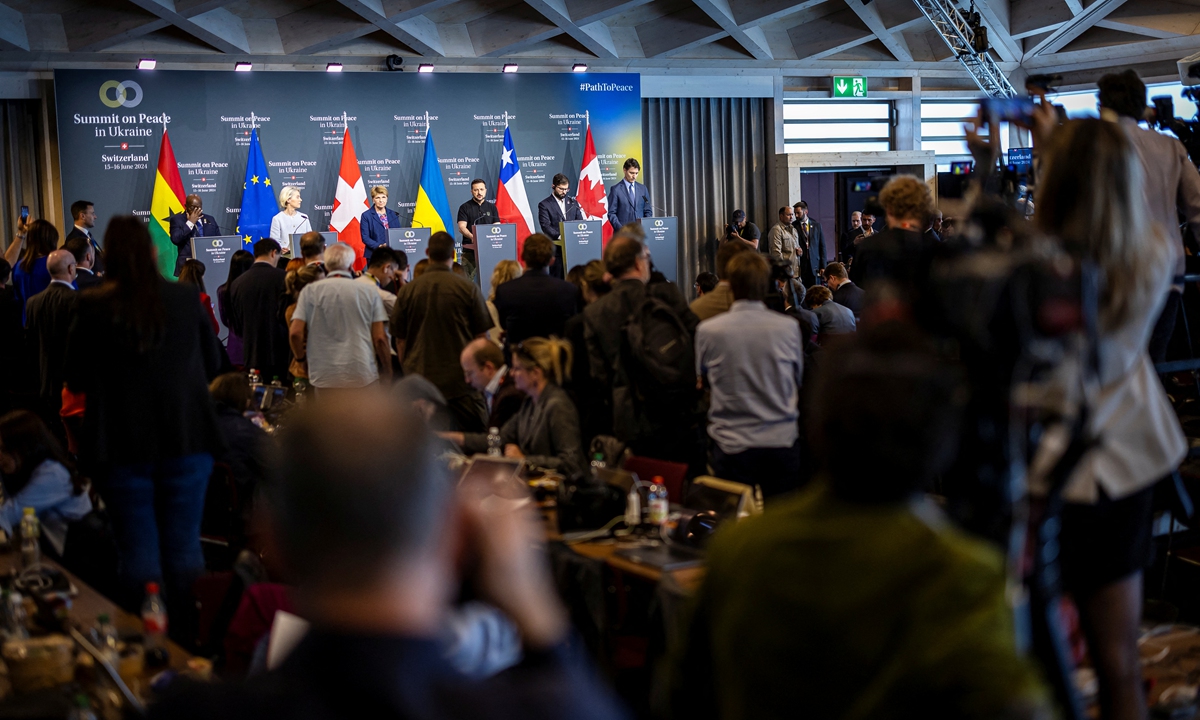'Anticlimactic' peace conference ends with key regional powers failing to sign communique
2024-10-17 02:51:21本站

Some official representatives and leaders hold a press conference after the Summit on Peace in Ukraine on June 16, 2024 in Switzerland. Photo: IC
The two-day peace conference held in Switzerland on the Ukraine crisis marked by the absence of Russia came to an anticlimactic close on Sunday, as key regional powers including Brazil, India, South Africa and Saudi Arabia didn't sign up to a joint communique issued at the end of the gathering.
The joint communique was vague, touching on topics such as nuclear weapons, food security and the release of prisoners of the Russia-Ukraine conflict, but left key questions on how and when to end the conflict as well as the reconstruction of Ukraine.
The peace conference ended without any significant progress. US Vice President Kamala Harris who represented the US at the meeting also returned home ahead of schedule, followed by French President Emmanuel Macron and Japanese Prime Minister Fumio Kishida, who also skipped the meeting on Sunday, according to media reports.
Observers pointed out that many Western attendees are just putting on a show to demonstrate "political correctness," align with their domestic political positions, and support activities on Ukraine to gain support and votes.
Also, for this conference, Ukraine and the US-led Western clique have made great efforts to woo Global South nations, but their scheme suffered a setback.
According to multiple media outlets, major regional countries including Brazil, India, South Africa, the United Arab Emirates, and Saudi Arabia, all of which are members of BRICS or key powers in the Global South, did not sign the communique.
Analyzing the factors behind why those Global South major countries refused to sign the communique, Zhang Hong, an associate research fellow at the Institute of Russian, Eastern European and Central Asian Studies of the Chinese Academy of Social Sciences, described the document as "unbalanced" as it only reflects Ukraine's claims.
Signing such a communique may harm their relationship with Russia, Zhang told the Global Times on Monday. Also, they are concerned that endorsing Ukraine unilaterally could have a negative impact on the Russia-Ukraine conflict, according to Zhang. If more countries take sides, it could escalate the conflict, which would go against their goal of facilitating peace talks, the expert explained.
Faced with such a situation, Ukrainian President Volodymyr Zelensky, who had previously criticized China at the Shangri-La Dialogue in Singapore, also changed his tune.
"I believe that China could help us. That is why I would very much like certain proposals that the Chinese side has to be in our dialogue," the Ukrainian president said at a press conference in Switzerland on Sunday. He also stressed that "Ukraine has never said that China is our enemy."
Asked to comment on the peace conference communique, Chinese Foreign Ministry spokesperson Lin Jian on Monday said that China's position on the Ukraine crisis is consistent and clear. He noted that China did not attend the peace conference and will not comment on the joint communique of the meeting.
China has always been a responsible major power, maintaining a balanced and rational position on the Ukraine crisis, which should be respected and cherished by Ukraine and the international community, Zhang said, who believes Zelensky's statement this time is a correction of his previous remarks on China.
"This conference has made him realize the important role China plays in advocating for peace talks in the Russia-Ukraine conflict," Zhang said.
Another point from the joint communique that caught public attention was the removal from the document of a previous reference to the Russian "aggression" and instead using the word "war."
This is a sign that Ukraine and the US-led Western camp were forced to compromise as the conference expanded from the West to many Global South countries, resulting in more divided views on the conflict and an unwillingness to take sides, observers said.
Countries including Turkey, Saudi Arabia and Kenya noted Russia's absence as a hurdle, the Guardian reported on Sunday.
"After this summit, the calls for Russia to join such a gathering for peace talks in the future will only grow stronger," Zhang said.
文章地址:http://mobile.dalian183.cn/html/103c799134.html (转载请注明出处)
免责声明:本文仅代表作者个人观点,与本网站无关。其原创性以及文中陈述文字和内容未经本站证实,对本文以及其中全部或者部分内容、文字的真实性、完整性、及时性本站不作任何保证或承诺,请读者仅作参考,并请自行核实相关内容。